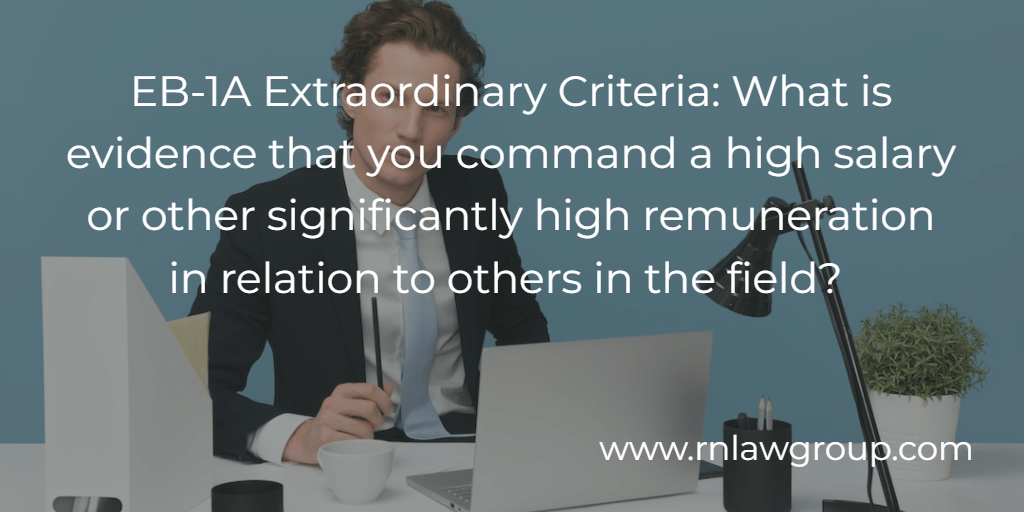
EB-1A Extraordinary Criteria: What is evidence that you command a high salary or other significantly high remuneration in relation to others in the field?
The EB-1A employment-based immigration visa can appear to be a daunting process. An applicant must either show proof of a one-time achievement (major internationally-recognized award) meet 3 of the 10 listed criteria:
- Evidence of receipt of lesser nationally or internationally recognized prizes or awards for excellence
- Evidence of your membership in associations in the field which demand outstanding achievement of their members
- Evidence of published material about you in professional or major trade publications or other major media
- Evidence that you have been asked to judge the work of others, either individually or on a panel
- Evidence of your original scientific, scholarly, artistic, athletic, or business-related contributions of major significance to the field
- Evidence of your authorship of scholarly articles in professional or major trade publications or other major media
- Evidence that your work has been displayed at artistic exhibitions or showcases
- Evidence of your performance of a leading or critical role in distinguished organizations
- Evidence that you command a high salary or other significantly high remuneration in relation to others in the field
- Evidence of your commercial successes in the performing arts
These criteria can make even very well qualified candidates nervous about their eligibility, but with the right experience, the right lawyer, and a little luck, an applicant can have their Green Card in as little as three months. This series of articles will provide a background on each of the 10 criteria, examples of documents that can meet them, and common pitfalls to avoid.
A candidate for the EB-1A visa must be able to show that their unique skill commands a high salary or other kind of compensation. According to the USCIS, a high pay is one that is much higher than the going rate for the employee’s occupation in the location of employment. This stipulation is necessary to guarantee that the applicant’s exceptional talent will be valued in their line of work.
The candidate must show proof that they currently command a high income or have in the past demanded a high compensation in order to satisfy the high salary criteria. While deciding whether an application fits this condition, the USCIS takes into account a number of variables. They include the applicant’s past salaries, the wage requirements in their business, their reputation and position in their field, and more. They include the applicant’s past salaries, the wage ranges for people in the applicant’s profession, the applicant’s standing and reputation in their field, and the applicant’s level of training and experience.
The Strongest Argument for High Salary Requirements
A candidate must offer convincing proof that they currently command or have previously earned a high income in order to satisfy the high salary criteria. To meet this criteria, the USCIS accepts a variety of forms of evidence, including:
- Employment Offer Letter: A letter outlining an applicant’s pay in an employment offer is a reliable sign that they will earn a high income. The letter must be printed on the business’s letterhead and contain information on the position’s title, pay scale, and responsibilities.
- Tax Records: Tax records, including W-2s, pay stubs, and income tax returns, can attest to an applicant’s past salaries. An explanation of how these documents show the applicant’s high pay should be provided with the supporting documentation.
- Salary surveys: Reputable sources can reveal the applicant’s occupation’s industry standards for salaries. These polls are to be carried out by impartial third parties and ought to include information about the applicant’s particular job and place of residence.
- Expert Opinion Letters: Letters of expertise from respected professionals in the applicant’s area can attest to the applicant’s position and reputation in that field. The qualifications and experience of the author, a declaration that they are familiar with the applicant’s work, and an explanation of how the applicant’s compensation represents their outstanding skill should all be included in these letters.
- Award Certificates: Award certificates, like those for Nobel Prizes, MacArthur Fellowships, and other esteemed honors, can attest to an applicant’s extraordinary talent and position in their profession. These accolades should be explained together with how they attest to the applicant’s high income.
Typical Mistakes to Avoid
Several typical errors might harm an applicant’s chances of being accepted despite the wealth of proof they can offer to back up their high pay request. They consist of:
- Lack of Support: The most frequent mistake is failing to provide support for the applicant’s high compensation. Candidates must offer convincing justification for their high remuneration, demonstrating their exceptional abilities.
- The provision of evidence that is wrongly presented or perceived is another frequent error. Candidates must make sure their supporting documentation is credible, accurate, and presented in a clear and understandable way.
- Lack of Context: Applicants must provide their evidence context to demonstrate how it applies.
What can you expect from an Request for Evidence
When more data or proof is needed to assess an applicant’s eligibility for the EB-1A visa category, the USCIS will issue a Request for Evidence (RFE). RFEs for the high salary requirement frequently request specific documentation to support the claim that the applicant commands a pay that is substantially higher than the going rate for the applicant’s occupation in the applicant’s place of employment. The following are some typical RFE requests for the high pay criteria:
- Proof of the prevailing wage for the applicant’s occupation in their place of employment: In order to assess whether the applicant’s salary satisfies the high salary criteria, the USCIS may request evidence of the prevailing wage for the applicant’s occupation in their place of employment. For example, salary surveys, industry reports, or other reliable information sources.
- Describe how the applicant’s pay stacks up against that of others in their field: The USCIS may ask for proof showing how the applicant’s pay stacks up against others in their field with equivalent education and experience. These could include pay surveys, employment statistics, or other data particular to the industry.
- How the applicant’s remuneration reflects their outstanding abilities, explained: The USCIS may ask for proof that the applicant’s income accurately represents their extraordinary skill in their line of work. This could consist of letters from experts, accolades, and other proof of the applicant’s success.
- Further pay history evidence may be required by the USCIS in order to ascertain whether the applicant has regularly earned a high wage throughout the course of their work. This could consist of pay stubs, employment contracts, tax records, or other proof of the applicant’s prior earnings.
- Documentation of the applicant’s employment activities and responsibilities may be required by the USCIS in order to ascertain whether the applicant’s pay is reasonable for their level of education and experience. Job descriptions, performance reviews, and other examples of the applicant’s work product may be included.
It is critical to provide all necessary proof and information in a quick, detailed response to RFEs. It’s possible for the EB-1A visa application to be rejected if you don’t respond to an RFE or don’t offer enough supporting documentation. Applicants can navigate the RFE procedure and improve their chances of success by working with an expert immigration lawyer.
By: Karim Jivani
Karim Jivani is a Special Attention Staff Attorney at Reddy Neumann Brown PC who focuses on employment-based non-immigrant visas. Karim’s practice covers all phases of the visa process including filing petitions, responding to Requests for Evidence (RFE), and drafting motions and appeals. He has completed over 30 RFE’s to date in response to H-1B, L-1, I-140, and VAWA petitions.

